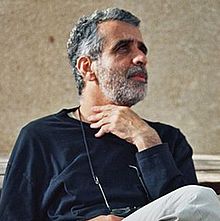Israel Finkelstein
| Israel Finkelstein | |
|---|---|

Israel Finkelstein, 2007
|
|
| Native name | ישראל פינקלשטיין |
| Born | 1949 (age 67–68) Petah Tikva, Israel |
| Nationality | Israeli |
| Fields | Archaeology |
| Institutions | Tel Aviv University |
| Alma mater | Tel Aviv University, University of Chicago, Harvard University, Pantheon-Sorbonne University |
| Known for | The Bible Unearthed |
| Notable awards | Dan David Prize |
|
Website humanities.tau.ac.il/segel/fink2/ |
|
Israel Finkelstein (Hebrew: ישראל פינקלשטיין, born 1949) is an Israeli archaeologist and academic. He is the Jacob M. Alkow Professor of the Archaeology of Israel in the Bronze Age and Iron Ages at Tel Aviv University and is also the co-director of excavations at Megiddo in northern Israel. He served as Director of the Sonia and Marco Nadler Institute of Archaeology at Tel Aviv University from 1996–2002. In 2005 he received the Dan David Prize.
Israel Finkelstein was born in Petah Tikva. He completed his studies at Tel Aviv University and wrote his Ph.D. thesis on the excavations at Izbet Sartah, an early Iron site, for which he served as field director.
Finkelstein specializes in Middle Eastern archaeology of the ancient history of the Land of Israel. He is critical of scholars who read the results of their excavations as confirming the biblical narratives of conquest. He has described 10th century BCE Jerusalem, the period associated with the biblical kings David and Solomon, as a "small hill town, with a modest palace and royal shrine."
Though rejecting the ultra-minimalist position that places the composition of the Bible in the Persian or Greek period, i.e., after the return from the Babylonian exile, he argues that much of the Bible was written from the seventh through the 5th century BCE. Notwithstanding his dismissal of the literal approach to Biblical history, Finkelstein believes that "New archaeological discoveries should not erode one's sense of tradition and identity".
Finkelstein is a proponent of the "low chronology," an archaeological reconstruction that attempts to solve problems in the traditional Levantine chronology by "lowering the date of 11th-century BCE assemblages to the early-to-mid-10th century, and 10th century BCE assemblages to the early 9th century, with the late Iron I/early Iron IIA transition fixed in the late 10th century BCE".
...
Wikipedia
